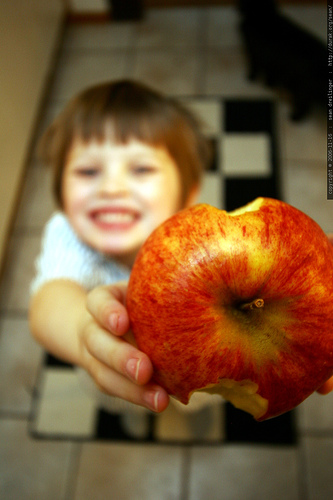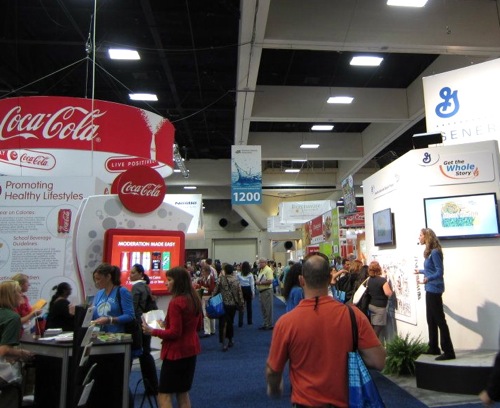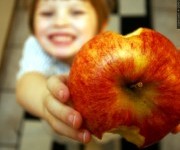Send your question to Umbra!
Q. Dear Umbra,
I was recently at my local farmers market and spied some beautiful apples. I asked the farmer how they were grown, and he kindly explained that they were not organic, but that he does try to minimize pesticide use and only uses water-soluble pesticides and sprays a minimum of a month before harvest. He said that the rain washes it all away by the time they are picked. I used to be totally happy to support local farmers even if they weren’t organic, but now I’ve got two little kiddos, and I’m getting pickier about what we eat, not just where it was grown. So what do you think? Is he right, that these apples are safe? I’m having a hard time finding other sources of local, organic apples. Thanks!
Monte
Hudson, OH
 Photo: Sean DreilingerA. Dearest Monte,
Photo: Sean DreilingerA. Dearest Monte,
Until you mentioned your sweet, apple-cheeked children, I was going to let your farmer’s fuzzy claims slide, because I am a firm believer in supporting local agriculture. However, scientists are finding more and more reasons to avoid feeding pesticides to children. And apples, as it happens, have won the dubious distinction of being the pesticide-iest produce on EWG’s Dirty Dozen list, as well as being flagged by Consumer Reports.
The small people in our lives are particularly sensitive to pesticides, because their wee bodies are not as well equipped to process toxic substances, and because they eat more, pound for pound, than we do. Pesticides have been linked to lower IQ, ADHD, birth defects, and other ills, and “the evidence just keeps getting stronger,” says Kristin Schafer, a senior policy analyst at the Pesticide Action Network. The EPA, which regulates pesticide use, acknowledges that children and pesticides are a concern; let us take a moment to savor the work of the agency’s Creative Use of Punctuation Department, which tells us, “Also, there are ‘critical periods’ in human development when exposure to a toxin can permanently alter the way an individual’s biological system operates.”
Critical periods indeed. I should point out, however, that that self-same EPA has established regulations for pesticide use that are considered conservative by many in the apple industry. If you were to speak, for instance, with Bruce Grim, a cheery fellow who is head of the Washington State Horticultural Association and a former Apple Person of the Year, he would assure you that his family has been growing (and eating) apples for 81 years with no ill effects, that children’s health is taken into account when regulations are made, and that washing your fruit helps minimize risks. He would also assure you that, as we have discussed before, many growers are moving away from a full reliance on pesticides and into the more creative methods of Integrated Pest Management, which involves doing salacious things like flooding orchards with pheromones to keep codling moths from mating.
It may well be that your local farmer is doing something along those lines. It certainly sounds like he’s aware of the issues around pesticides — or at least aware that consumers are concerned. I applaud you for asking him about his practices, and encourage you to follow up for more details if you’re comfortable. We should all try to find out more about where our food comes from. For those of you who are shy or unsure what to say, Sustainable Table has a lovely guide. And if you’re looking for sources of local and organic food, Local Harvest is a good starting point.
Monte, ultimately you’ll have to make the decision that feels right for your family. But I will leave you with this sentiment from Sandra Steingraber’s Organic Manifesto [PDF]: “Whatever we do or don’t know about threshold levels for harm, my intuition tells me that food with no poison is better for my children’s developing minds and bodies than food with some.”
Pericarpily,
Umbra



